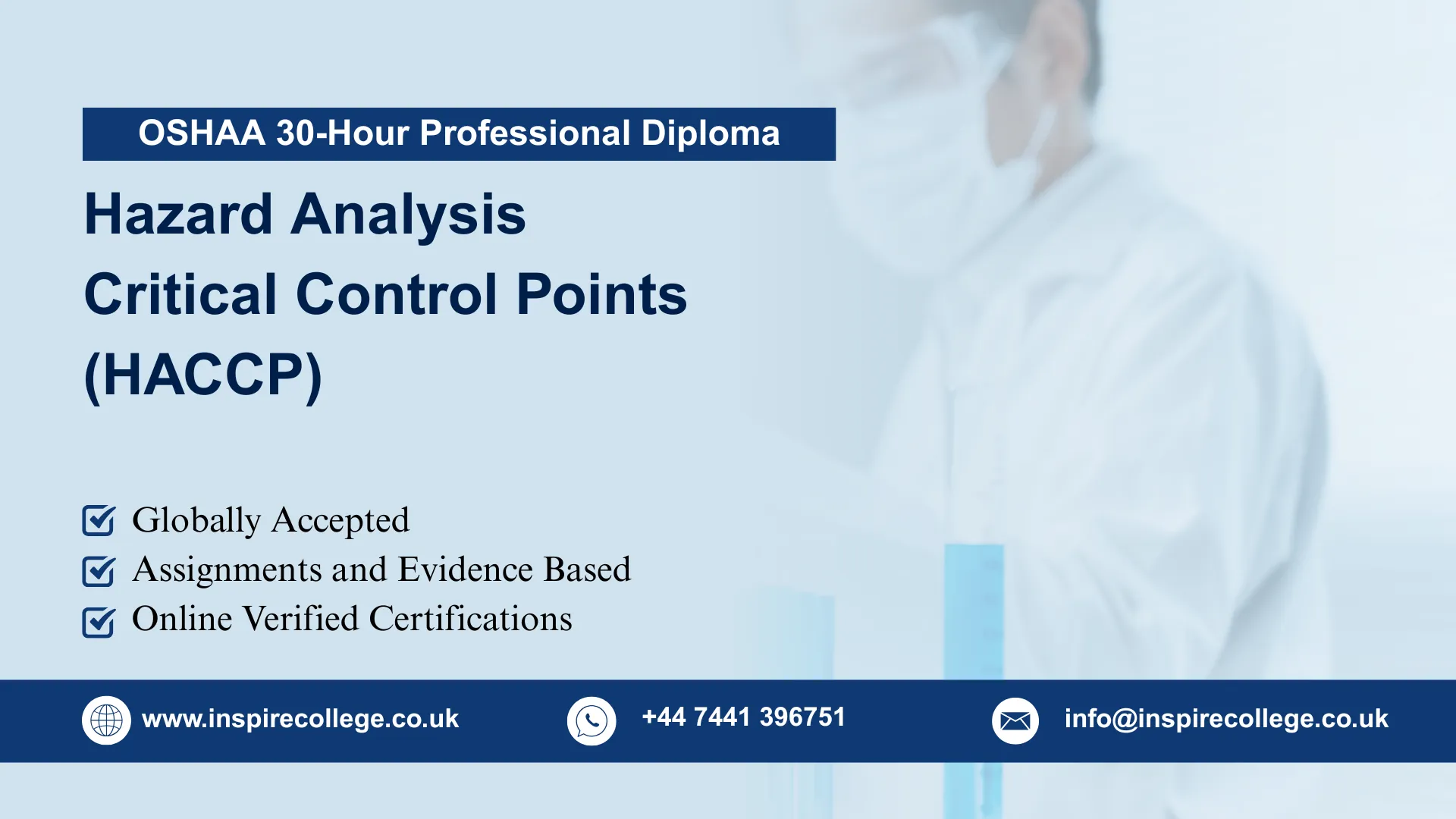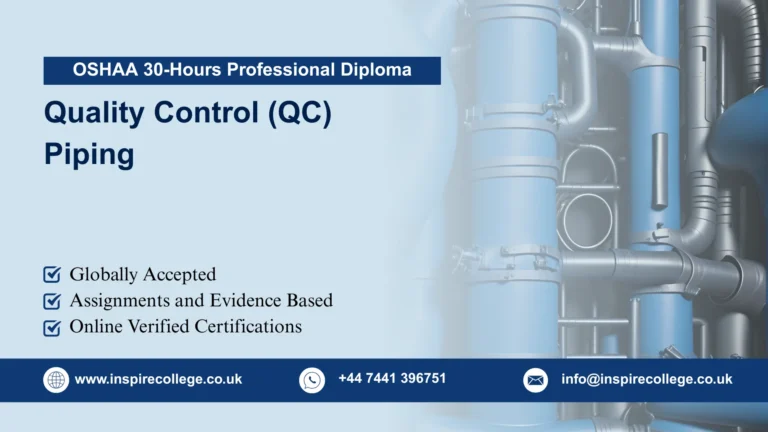
OSHAA 30-Hour Professional Diploma in Hazard Analysis Critical Control Points (HACCP)
Ensuring food safety and quality is a critical responsibility for organizations across the food production, processing, and service industries. The OSHAA 30-Hour Professional Diploma in Hazard Analysis Critical Control Points (HACCP) is designed to equip professionals with the essential knowledge and practical skills needed to implement HACCP systems effectively, identify hazards, and maintain the highest standards of food safety compliance.
OSHAA 30-Hour Professional Diploma in Hazard Analysis Critical Control Points (HACCP) provides comprehensive coverage of HACCP principles, including hazard identification, risk assessment, critical control point determination, monitoring procedures, corrective actions, verification, and record-keeping. Participants will gain in-depth understanding of both biological, chemical, and physical hazards and the methods to control and prevent contamination throughout the food supply chain.
By completing OSHAA 30-Hour Professional Diploma in Hazard Analysis Critical Control Points (HACCP), learners will acquire the competence to develop, implement, and manage HACCP-based food safety systems in diverse workplaces such as food manufacturing, catering, hospitality, retail, and healthcare sectors. Practical applications are emphasized throughout the course, preparing professionals to conduct audits, monitor critical control points, evaluate compliance, and implement corrective measures to mitigate risks effectively.
The OSHAA 30-Hour Professional Diploma in HACCP is ideal for food safety officers, quality assurance managers, production supervisors, EHS professionals, and other industry personnel responsible for maintaining safe, hygienic, and compliant food operations. Beyond enhancing professional skills and knowledge, OSHAA 30-Hour Professional Diploma in Hazard Analysis Critical Control Points (HACCP) contributes to Continuing Professional Development (CPD), empowering learners to ensure sustainable food safety practices that protect consumers, safeguard organizational reputation, and comply with international food safety standards globally.
To ensure learners are well-prepared to maximize the benefits of the OSHAA 30-Hour Professional Diploma in HACCP, applicants should meet the following criteria:
- Age Requirement
- Applicants must be at least 18 years old at the time of enrollment.
- This ensures maturity and readiness for professional-level training in food safety and hazard management.
- Educational Requirements
- Minimum of a high school diploma or equivalent qualification.
- Candidates with prior education in food science, nutrition, microbiology, environmental health, or related disciplines will have an advantage.
- Additional certifications in hygiene, quality assurance, or occupational safety are considered beneficial.
- Professional Experience
- Prior experience in food handling, production, or quality assurance is recommended but not mandatory.
- Ideal learners include food safety officers, quality assurance managers, production supervisors, catering and kitchen staff, and EHS professionals.
- Experience in implementing food safety procedures or monitoring compliance enhances understanding and practical application.
- Technical Skills
- Basic computer literacy, including familiarity with email, online learning platforms, and documentation software.
- Competency in using Microsoft Office (Word, Excel, PowerPoint) or equivalent tools is advantageous for record-keeping and reporting.
- Motivation and Commitment
- Learners must demonstrate genuine interest in food safety, HACCP principles, and hazard management.
- Commitment to completing 30 hours of structured learning, including practical exercises, assessments, and case studies, is essential.
- Strong dedication to professional development and workplace improvement is expected.
- English Language Proficiency
- Good command of written and spoken English is required to understand technical terminology, food safety regulations, and workplace communication.
Mandatory Units
The OSHAA 30-Hour Professional Diploma in Hazard Analysis Critical Control Points (HACCP), to achieve the qualification candidates must complete all the mandatory units form the following :
Mandatory Units
- Introduction to HACCP and Food Safety
- Hazard Analysis and Risk Assessment
- Establishing Critical Control Points (CCPs)
- Setting Critical Limits and Monitoring Procedures
- Corrective Actions and Preventive Measures
- Verification and Validation of HACCP Plans
- Documentation and Record Keeping
The OSHAA 30-Hour Professional Diploma in HACCP is designed to equip learners with the knowledge, skills, and practical competence needed to develop, implement, and manage effective HACCP-based food safety systems. Participants will gain a thorough understanding of food safety principles, hazard analysis, critical control points, and international regulatory standards, enabling them to protect public health, ensure compliance, and enhance operational efficiency in diverse food-related industries.
1. Introduction to HACCP and Food Safety
- Understand the fundamental principles of HACCP and its importance in global food safety.
- Explain the relationship between food safety, hygiene, and regulatory compliance.
- Identify the key roles and responsibilities of food safety professionals in implementing HACCP systems.
- Recognize the impact of foodborne illnesses and contamination on public health and business operations.
2. Hazard Analysis and Risk Assessment
- Identify biological, chemical, and physical hazards that may occur in food production, processing, and handling.
- Conduct risk assessments to evaluate the likelihood and severity of potential hazards.
- Develop strategies to mitigate identified risks and prevent food contamination.
- Apply analytical methods to prioritize hazards and determine control measures.
3. Establishing Critical Control Points (CCPs)
- Determine critical points in food processes where hazards can be prevented, eliminated, or reduced to acceptable levels.
- Establish measurable and actionable control points in alignment with HACCP principles.
- Evaluate the effectiveness of CCPs in reducing risks across the food supply chain.
- Integrate CCP monitoring into operational workflow for consistent food safety management.
4. Setting Critical Limits and Monitoring Procedures
- Define clear and measurable critical limits for each CCP to ensure hazard control.
- Design and implement monitoring procedures to track compliance with critical limits.
- Apply practical techniques for recording and interpreting monitoring data.
- Use monitoring results to maintain operational safety and prevent deviations.
5. Corrective Actions and Preventive Measures
- Develop corrective action plans to address deviations from critical limits.
- Implement preventive measures to avoid recurrence of hazards.
- Train staff and enforce standard operating procedures (SOPs) for effective risk mitigation.
- Evaluate the impact of corrective actions on overall food safety and process improvement.
6. Verification and Validation of HACCP Plans
- Conduct verification procedures to confirm that HACCP plans are effectively implemented.
- Validate processes to ensure they achieve intended food safety outcomes.
- Identify areas for continuous improvement based on verification and validation results.
- Use verification data to support regulatory compliance and audit readiness.
7. Documentation and Record Keeping
- Maintain comprehensive records of hazard analyses, CCP monitoring, corrective actions, and verification results.
- Ensure documentation meets international regulatory standards and audit requirements.
- Utilize records for traceability, accountability, and continuous improvement of HACCP systems.
- Demonstrate proficiency in preparing reports and documentation to support organizational food safety policies.
The OSHAA 30-Hour Professional Diploma in HACCP is designed for professionals who are committed to ensuring the highest standards of food safety, quality, and regulatory compliance within their organizations. This program is ideal for learners seeking to enhance their knowledge and practical skills in hazard analysis, critical control point management, and effective food safety systems.
This diploma is particularly suitable for:
- Food safety officers responsible for monitoring, controlling, and maintaining safe food operations.
- Quality assurance managers and production supervisors overseeing food production, processing, or catering operations.
- Environmental Health and Safety (EHS) professionals ensuring compliance with food safety regulations and workplace hygiene standards.
- Catering managers, kitchen staff, and food handlers involved in restaurants, hotels, hospitals, or institutional food services.
- Graduates and professionals from food science, nutrition, microbiology, health sciences, or related fields aiming to specialize in HACCP and food safety management.
- Individuals committed to Continuing Professional Development (CPD) and professional growth in occupational food safety, hygiene, and compliance management.
By completing this diploma, learners will gain the competence to implement HACCP systems effectively, identify and mitigate potential food hazards, monitor critical control points, and ensure compliance with international food safety standards. Graduates will be fully prepared to enhance workplace food safety, protect public health, and contribute to a culture of hygiene, risk management, and operational excellence in food-related industries worldwide.
Register Now
OSHAA 30-Hour Professional Diploma in Hazard Analysis Critical Control Points (HACCP)






